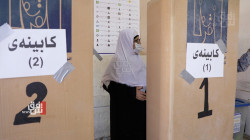Iraqi women shift to government jobs: 14% workforce participation amid rising harassment

Shafaq News/ Many Iraqi women are turning to government jobs or starting their own businesses to escape male supervision, driven by rising harassment, low wages, and other challenges in the private sector that have led to reduced female participation.
Female Workforce Declines
Women's representation in Iraq's labor market has fallen to just 14%, lower than the global average of 20%, according to the Strategic Center for Human Rights in Iraq. This decline comes as nearly 11% of Iraqi households are now led by women.
According to International Labour Organization statistics, Iraq has 13 million women of working age, but only 1 million are employed, with 70% working in the public sector and fewer than 300,000 in the private one. Dr. Fadel Al-Gharawi, head of the center, highlighted this disparity as “a significant issue” and called for a thorough investigation into the factors deterring women from entering the private labor market.
Severe Challenges
Dr. Al-Gharawi, speaking to Shafaq News, pointed out significant issues faced by women in Iraq's workforce, including “low wages, long hours, and unsafe working conditions, particularly in factories, as well as prevalent harassment.”
Umm Shahid from Baghdad corroborates these concerns, revealing that many women avoid private sector jobs due to fears of sexual harassment. “Some employers exploit female workers by demanding sexual favors for employment and higher wages, and then reduce their salaries if they refuse.”
“After experiencing this myself, I left the private sector and now work from home, producing and selling pastries online to avoid such harassment.” She noted, “Many women prefer government jobs, citing less harassment, better job equality, and established labor protections.”
In this context, Rhea Faiq Al-Khafaji, Executive Director of the Association for Press Freedom Defense in Iraq, confirmed that working women face multiple challenges, including discrimination, unequal pay, limited professional development, and cultural pressures that hinder their participation in the labor market. “Despite efforts to improve women's conditions, these obstacles continue to impede gender equality and women's rights in Iraq.”
In her discussion on challenges faced by working women, Faiq emphasized to our agency “the need for improved legislation, policies, and societal awareness to better support and empower working women,” highlighting issues such as “harassment, wage disparities compared to men, and difficulty obtaining promotions due to discrimination or a preference for men in leadership roles.”
Faiq further highlighted that "employment contracts in the private sector are sometimes unstable, which exposes women to the risk of job loss without clear reasons. Moreover, there is a lack of support for working mothers, who may struggle to balance work and childcare due to insufficient support such as maternity leave or childcare services."
Legal, Financial Safeguards
Faiq affirmed the importance of women being aware of Iraq's anti-harassment laws, which include penalties for sexual harassment, advising women “to report it immediately to the police or their workplace’s legal department and to preserve any supporting evidence, such as messages or witness statements.”
Sexual harassment is defined in Iraq's Labor Law No. 37 of 2015 as "any physical or verbal sexual behavior, or any other sex-based conduct, which affects the dignity of women and men, is undesirable, unreasonable, and insulting to those who receive it, and leads to the rejection or non-submission of any person to such behavior, explicitly or implicitly, to make a decision that affects their job."
Article 10 of the Iraqi Labor Law prohibits "sexual harassment in the workplace and all stages of employment, including job search, vocational training, and employment, as well as any behavior that creates an intimidating, hostile, or degrading work environment for those subjected to it."
To safeguard their financial rights, the Executive Director recommended securing a written employment contract that clearly outlines all entitlements, including salary, allowances, and working hours. “If financial rights are breached, women can pursue legal action to claim their entitlements, including equal pay for equal work.”
Faiq also suggested that women join labor unions for protection and legal support, and consult with labor law experts for advice if their rights are violated.
“These strategies are vital for women to address workplace challenges and defend their rights.”





